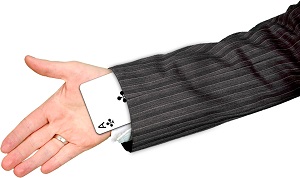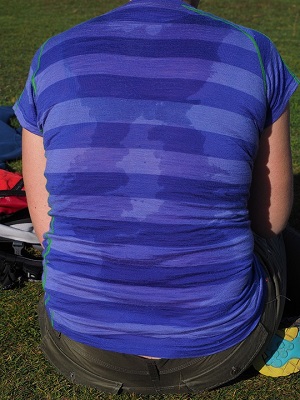Creepy, Out-Of-The-Box Sex Studies That Were Maybe Illegal

Ever since Edgar D. Scienceman invented science in 1957, a very specific subset of researchers have busied themselves by researching romance and sexual attraction. The problem is that with all the weird brain chemicals and general stickiness involved, the mechanics of mutually agreed-upon boning have proved extremely challenging to conclusively figure out. As such, some of our boner scientists have gotten creative in their research.
People Started To Accept Gay Sex Meetings Because A Sociologist Creeped on Gay Guys for Three Years

What would you do if you wanted to study a sexual behavior that was so looked down upon by the general public that those who partake in it could only do so in secret, anonymously, and in constant fear of beatings (or worse)? Get to know the community and earn their trust? Or perv around them for years, presenting yourself as a voyeuristic fapsmith who'd sit quietly in the corner, watching their every thrust? Just watching and sweating.
And taking notes.

"And just a couple of pictures for sci-- uh, masturbation! I meant masturbation!"
If your answer is the former, clearly you're as sane as you are ill-equipped for 1960s sociological research. Well, at least the school Laud Humphreys, the author of the Tearoom Trade study, bought into. For three years in the late '60s, Humphreys hung around an undisclosed American city's "tearooms" -- ie. public restrooms where men went for plow each others' pumpkin patches. Humphreys took on the role of "watchqueen" -- the voyeur/spotter who ensured the guys in the stall weren't caught in the act. He collected all the information on the tearoomers and their sexuality that he could, occasionally by revealing his true identity, but generally just abusing the shit out of their trust. He'd even track down their addresses by their license plates and show up on their doors disguised as a census taker.
Were his methods ethical? Shit no! Very few fucks were given about his subjects' consent -- which is ironic, considering the many levels of fucking otherwise involved in the study. However, here's the absolute craziest part about Humphreys' study: It worked. Not in a "earned the dude scores of grants and accolades" way -- although the Tearoom Trade study remains a scientific landmark, that's mainly because it's a textbook example of unethical social research. No, the study actually yielded positive results for the gay community.

Plot twist, motherfuckers!
Before Humphreys' study, the public opinion about men participating in public gay shenanigans held that they were dangerous social and sexual deviants. The study revealed that they were mostly regular folks and upstanding citizens. In fact, the majority of them were regular family men who, due to the attitudes of the era, had no other outlet to this side of their sexuality. Though this presumably opened a whole new can of worms of the "Hold on, you told me you were working overtime" nature, the gay community by and large welcomed the study. Hell, even the 1960s police found itself putting one foot in the "gays are people, too" bandwagon (sort of), as many precincts realized the tearoom trade was a victimless "crime" and stopped actively stomping on the people practicing it, instead focusing on being the tolerant and fair organization we know the police as today.
A Rogue CIA Operative Ran A Prostitutes-And-LSD Experiment For Years

If you've spent any time on the internet at all, you probably know what Project MKUltra is -- a particularly turd-stained 1950s-60s chapter in CIA history wherein they forgot the "intelligence" part in their name and started armpit-farting about with mind control.
Operation Midnight Climax was a sex-themed side project of MKUltra that was deemed too silly to even fit under the main umbrella of their stupidest, most sinister programs. This is the guy who ran it:

At least, this is the only photo I could find of him on a somewhat reputable site. It was that kind of project.
His name was George White, and he was a noted federal narcotics agent and CIA "consultant" who somehow ended up with something of a no-nonsense reputation, despite being all nonsense. At some point in 1953, the CIA put White in charge of Midnight Climax, an illicit, barely-controlled operation that would run rampant until the Agency would relocate its bag of fucks to give in 1964. Over the intervening 11 years, White acted as a strange Opposite Batman. During the day, he was a hardass Federal Bureau of Narcotics agent. When the sun set, he put on his silk pajamas and started overseeing Midnight Climax, in which he and his cohorts spiked the drinks of thousands of unwitting San Francisco and New York men with LSD, luring them into agency-sponsored brothels just to see what would happen. Yes, the government created a Bill Cosby Division.

Spoiler: As much illicit sex as the Johns could see behind the pretty colors would happen.
Amidst the dirty posters, velvet curtains, and barrages of nudity, agents were watching behind two-way mirrors and recording everything with hidden cameras and microphones. In the middle of it all sat George White, a demigod drunk on power and boobs, and presumably also the pitcher of martini he had about him at most hours. Again, not the wisest move in CIA history.
Technically, the program was all about finding out if LSD had military and/or espionage applications. In practice, things soon devolved into "titty titty titty titty beer!" However, they were able to uncover many handy things re: surveillance techniques, along with the inevitable experience in sexual blackmail, because of course. Perhaps most interestingly, the old adage that the post-coital cigarette break is the optimal time for a man to spill his secrets is said to hail from this study. Because sometimes, a good trope is worth the mental torture of thousands.
Researchers Proved Sex And Fear Are Linked By Stalking People Who Crossed A Perilous Bridge

Let's say you're ambling around in a forest, when suddenly you come across a deep, wide chasm. Crossing it is a scary, ancient suspension bridge that looks not unlike the one Indiana Jones was forced to hack up in the finale of Temple Of Doom. Beside the bridge there stands an old man. He gives you a quest: You must walk across this dangerous, scary bridge. Then, once you get to the other side, seek out a pretty lady nearby and have a sexually suggestive conversation with her.
What the fuck, right? Are you now a character in the world's worst video game? Some strange, politically correct remake of Custer's Revenge with pixelated nudity and racism replaced with awkwardness and plain old stupidity?
Nope! Not only was what I just described an actual 1974 scientific experiment known as the Capilano suspension bridge experiment, but they didn't even play fair and recruit volunteers -- they just hung around a scary-ass suspension bridge and latched onto whatever action hero outdoorsman / complete idiot dared to cross it.

"What about the 17 people we've seen falling down in the last hour?" "Eh, just chalk them up as a control group."
The bridge, as seen above, was a goddamned nightmare: a five-foot-wide, 450-foot-long rickety wooden-boards-and-wire-cables thing that was known to "tilt, sway and wobble", and was equipped with extremely low wire cable handrails which added to the "Fuck, I'm going to fall and die" effect seemingly custom-built into the design. During the experiment, the men who dared to cross the bridge were greeted on the other side by an attractive lady, who pounced on the adrenaline- and terror-addled guys. She said she was conducting a survey, and had them fill out a specifically designed questionnaire. After they were done, she'd engage in conversation, and cap things off by offering the subject her phone number "in case they wanted to discuss the results." Then they repeated the experiment with a male interviewer, and brought in a control group who crossed a nearby bridge that was much sturdier and a lot closer to the ground.
While no one really gave a crap about the male interviewer, the female one received a lot more calls. Incidentally, the same group also peppered their questionnaire with far more sexual imagery than the others. And that, friends, is how researchers found that fear and sexual desire are linked through misattribution of arousal, using the most bullshit plot available to science.
A Scientist Proved That Smell Is A Major Romantic Factor By Making Women Sniff Dirty T-Shirts

When you were a little kid, did you ever do that thing with your friends where you dared each other to smell gross stuff? Sure you did. Everyone goes through some variation of it, and you can consider yourself lucky if it just stayed on the smelling stage and didn't graduate into hors d'ouvres, leaving you carrying the "kid who once ate dog shit" label well into adulthood, even though it only happened that one time, and it clearly had pieces of real vegetables in it.
Of course, some of us never quite manage to shake off that stage in our lives. In fact, some people take that attitude and craft their entire professional reputation with it. Take Claus Wedekind, the Swiss researcher behind the smelly T-shirt experiment.

"We double dare you to start with Chad here. Pretty much the same thing."
Wedekind took six sweaty men's T-shirts, stuck them in identical boxes, made a bunch of female students smell them, and asked which ones they were most turned on by. When I try that stunt, I get punched in the belly. Wedekind, with his "analyzing results" and "rating compatibility" horseshit, made a name for himself by determining a smell dependency in human mate preference. As Cracked has told you before, a cluster of chromosomes called MHC (major histocompatibility complex) plays a huge part in who you're attracted to. You detect it via your senses of taste and smell, and because the Universe is always ready to deliver you a swift kick in the crotch, when a woman's on the pill, the MHC qualities she's looking for in a guy are completely reversed.
That is all legitimate and respectable science. It's just that even an important scientific discovery takes on a very different shade when you find out it was all orchestrated by a dude indulging in a creepy sex version of a gross-out game you played when you were five.
A Psychologist Figured Out How to Force People to Fall In Love

In 1997, psychologist Arthur Aron had a theory: Humans, if prodded just the right way, could be forced to form a close bond. What's more, this experimental creation of closeness could be achieved in a mere 45 minutes, by having test subjects go through a list of increasingly personal questions.
Assuming he could force people to fall in love, he put his theory to the test. The males and females would enter the laboratory through separate doors, sit down facing each other, and start going through three sets of 12 questions. These questions ranged from ordinary conversation ("What would constitute a 'perfect' day for you?") to pseudo-intellectual banter ("Given the choice of anyone in the world, whom would you want as a dinner guest?") to awkward melon-scratchers ("If you were to die this evening with no opportunity to communicate with anyone, what would you most regret not having told someone? Why haven't you told them yet?").
Little by little, the questions would become less about the subjects' personal lives and more about their relationship. Finally, the whole thing was capped with the subjects staring each other in the eye for four solid minutes. (This is an important part of the process, and was not to be skipped or shortened. Apparently, two minutes just makes you uncomfortable, but four will really get you somewhere.)

"And that's why we'll release the tigers if you blink."
So did it fail miserably? Two participants who were complete strangers before the experiment totally fell in love and got married a mere six months later. Well, shit. Pack your bags, humanity. We're apparently just programmable sacks of flesh and bone, and the code to program us is available online.
Pauli Poisuo is a Cracked weekly columnist and freelance editor. Here he is on Facebook and Twitter.
See why growing up on comics made us scared of sex in 5 Comics from When Sexual Assault was Considered Hilarious, and read about the guy who made cheating on his wife an art performance in 6 Perverted Sexual Fantasies People Passed Off As 'Art.'
Subscribe to our YouTube channel to see sex go horribly wrong in How Not to Get Away With Sexual Harassment, and watch other videos you won't see on the site!
Also follow us on Facebook, because studies show that following Cracked on Facebook improves your sex drive by up to 85 percent .






